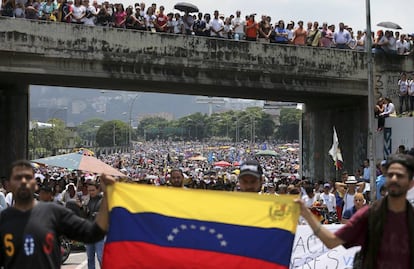Venezuela’s opposition rejects government offer of regional elections
More than three weeks of protests have left 23 people dead: new march planned for Wednesday
The protest marches that took place on Monday throughout Venezuela against the government of President Nicolás Maduro left at least two people dead amid widespread disorder. Opposition leaders sought to distance themselves from what they said had intended to be a peaceful protest involving sit-downs to occupy public areas. The Attorney General’s office has ordered four public prosecutors to look into the deaths.

The two deaths took place in the western state of Barinas, a stronghold of former president Hugo Chávez, and in neighboring Mérida.
In Caracas, a sit-in blocking one of the main roads into the capital led to a violent confrontation with police. Masked youths poured oil onto the road to prevent it being used, and local officials said there had been a number of motor vehicle accidents.
The protests of the last three weeks against the government of President Nicolás Maduro have proved more violent than previous demonstrations. Between February and June 2014, there were 43 deaths, while over the last 24 days, 23 people have been killed. In the absence of a political solution, there is a real possibility the conflict could spread.
I want elections now; I say that as president and head of the government President Nicolás Maduro
Meanwhile, the government has rejected demands for new general elections or a recall referendum. “Under no circumstances will there be general elections,” warned Disdado Cabello, who is the first vice-president of the United Socialist Party of Venezuela.
The opposition says it intends to take to the streets again on Wednesday in a repeat of the protests a week ago, when a march was organized from different points in the city to converge on the offices of the Ombudsman and that led to violent clashes with police and government supporters. An alternative destination has not been announced.
Wednesday’s demonstration, the 11th in 24 days, will in all likelihood provide another opportunity for the forces of law and order, supported by armed civilians, to face off against the opposition, which is not set up for violent confrontation. As far as the government and its supporters are concerned, the center of Caracas is holy ground.
Monday’s disturbances have been used by the government to justify keeping the opposition out of the center of the city, while at the same time portraying it as a dangerous urban guerrilla force out to provoke civil war.
So far, what is happening in Venezuela are outbreaks of spontaneous violence following the repression ordered by the government. The protests have impacted on the routine of all the capital’s residents. Blocking main roads has led to classes being cancelled in the private schools in the wealthy east and southeast of the city, as well as the temporary closure of some private universities. The government has threatened to fine institutions that suspend classes.
Between February and June of 2014, there were 43 deaths: over the last 24 days, 23 people have died
Monday’s sit-down protests attracted thousands of people, and are a clear bid to intensify the pressure on the government. In response, President Maduro has said he is prepared to hold state elections for governor. “I want elections now,” he said on television on Sunday. “I am saying that as president and as head of the government,” he added.
The National Election Council should have convened these polls in December, but says opposition parties need to update their membership lists before putting candidates forward. The opposition accuses the body, which is controlled by the government, of stalling in order to prevent the loss of key regions.
The government’s change of mind has been interpreted variously. Some say Maduro is trying to divide the opposition, while others say the offer should be taken up as it is vital to weaken the government wherever possible before the presidential elections due at the end of 2018. Then there are those who refuse to accept Maduro staying in office further, saying he has become a dictator.
But for the moment, the opposition seems to be working in the same direction and is refusing to take the government up on its offer. Former presidential candidate Henrique Capriles has said he will not accept the offer of elections in return for ending the protests, accusing the administration of trying to manipulate the opposition.
English version by Nick Lyne.
Tu suscripción se está usando en otro dispositivo
¿Quieres añadir otro usuario a tu suscripción?
Si continúas leyendo en este dispositivo, no se podrá leer en el otro.
FlechaTu suscripción se está usando en otro dispositivo y solo puedes acceder a EL PAÍS desde un dispositivo a la vez.
Si quieres compartir tu cuenta, cambia tu suscripción a la modalidad Premium, así podrás añadir otro usuario. Cada uno accederá con su propia cuenta de email, lo que os permitirá personalizar vuestra experiencia en EL PAÍS.
¿Tienes una suscripción de empresa? Accede aquí para contratar más cuentas.
En el caso de no saber quién está usando tu cuenta, te recomendamos cambiar tu contraseña aquí.
Si decides continuar compartiendo tu cuenta, este mensaje se mostrará en tu dispositivo y en el de la otra persona que está usando tu cuenta de forma indefinida, afectando a tu experiencia de lectura. Puedes consultar aquí los términos y condiciones de la suscripción digital.








































